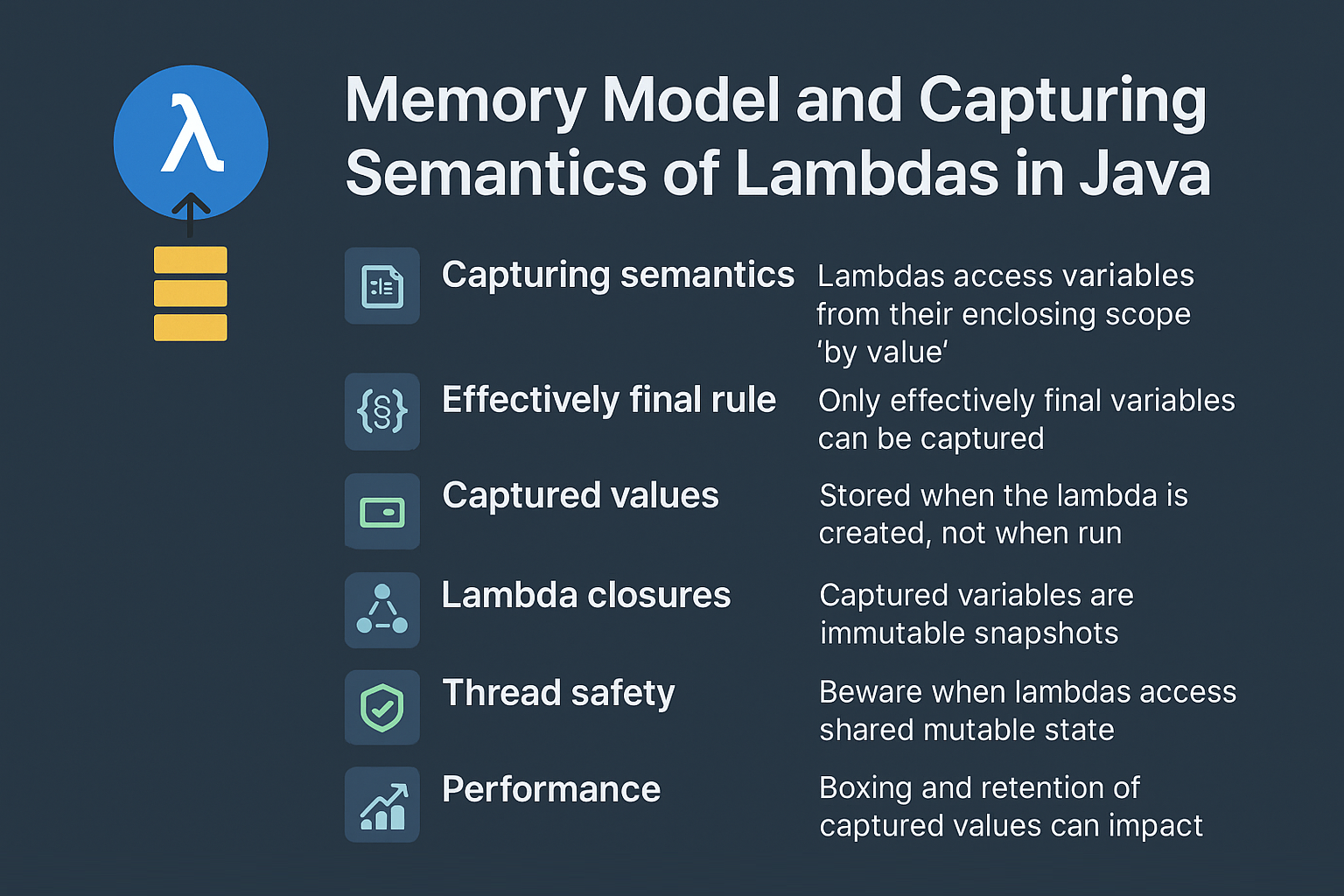Lambda expressions introduced in Java 8 revolutionized how developers write functional and concise code. But beneath their elegant syntax lies a web of complex behavior tied to the Java Memory Model (JMM) and capturing semantics.
This tutorial provides a deep understanding of how lambdas work under the hood, what variables they capture, how memory and closures behave, and what developers must know to avoid concurrency bugs, memory leaks, and confusing scoping issues.
🚀 Why Memory and Capturing Semantics Matter
Imagine assigning a task to a helper (lambda) and expecting them to remember a variable. Now imagine that variable changes in the meantime. Will the helper notice? Will your application behave predictably?
Understanding how lambdas capture variables and how the JVM handles them in multi-threaded and memory-sensitive contexts is crucial for:
- Writing correct concurrent code
- Avoiding memory leaks and race conditions
- Ensuring functional purity and immutability
🧠 What Are Capturing Semantics?
Capturing semantics refer to how a lambda expression accesses variables from its enclosing scope. In Java, this access is by value, not by reference (even for objects, it's a reference by value).
📘 Java Scoping Rule: Effectively Final
A lambda can only capture variables that are effectively final—i.e., not modified after initialization.
String name = "Ash";
Runnable r = () -> System.out.println(name); // OK
name = "John"; // Compilation error if uncommented
This ensures predictable behavior and avoids race conditions when lambdas are executed asynchronously.
📦 Captured Variables Are Copied
Captured values are copied to the lambda’s context when the lambda is created, not when it is executed.
List<Runnable> tasks = new ArrayList<>();
for (int i = 0; i < 3; i++) {
int finalI = i;
tasks.add(() -> System.out.println(finalI));
}
tasks.forEach(Runnable::run); // prints 0, 1, 2
🧬 Lambda Closures and the JVM
Lambdas in Java are implemented using invokedynamic and a synthetic class that implements the target functional interface. These synthetic classes capture variables using:
- Synthetic fields (for captured variables)
- Method references or inner class bytecode
Captured variables do not form closures like in JavaScript—they’re immutable snapshots.
🧵 Lambdas and the Java Memory Model
Is Lambda Execution Thread-Safe?
Only if:
- Captured variables are immutable
- The lambda does not access shared mutable state
- You’re not capturing instance fields that may change
List<String> shared = Collections.synchronizedList(new ArrayList<>());
Runnable r = () -> shared.add("Hello"); // Not thread-safe unless shared is thread-safe
🧪 Anonymous Class vs Lambda Capturing
| Feature | Anonymous Class | Lambda Expression |
|---|---|---|
Capturing this |
Refers to inner class | Refers to enclosing class |
| Shadowing allowed? | Yes | No |
| Serialization safer? | Yes (predictable structure) | Fragile (SerializedLambda) |
| Variable capturing rules | Same (effectively final) | Same |
📚 Real-World Example: Buggy Lambda Scope
List<Runnable> runners = new ArrayList<>();
for (int i = 0; i < 3; i++) {
runners.add(() -> System.out.println(i)); // WRONG: captures reference, prints 3, 3, 3
}
runners.forEach(Runnable::run);
✅ Fix:
for (int i = 0; i < 3; i++) {
int finalI = i;
runners.add(() -> System.out.println(finalI)); // Correct
}
🔄 Function Composition and Memory
Lambdas often form chains using andThen(), compose(), etc. Each chained lambda adds overhead by maintaining its own execution context (including captured variables).
Function<Integer, Integer> add2 = x -> x + 2;
Function<Integer, Integer> square = x -> x * x;
Function<Integer, Integer> composed = add2.andThen(square);
Memory is generally not a concern for short chains, but deep recursion or excessive nesting can increase GC pressure.
💡 Performance and Optimization
- Captured primitives are boxed, causing allocation.
- Lambdas referencing heavy objects can cause retention longer than needed.
- Use method references where possible (less capture).
list.forEach(System.out::println); // Better than x -> System.out.println(x)
📌 What's New in Java?
Java 8
- Lambdas,
java.util.function, closures, invokedynamic
Java 9
Optional.ifPresentOrElse
Java 11
varallowed in lambda parameters
Java 17
- Enhanced switch (compatible with lambdas in expressions)
Java 21
- Scoped values: control what lambdas can "see" across threads
- Virtual threads: lightweight concurrency for functional code
✅ Conclusion and Key Takeaways
- Java lambdas can only capture effectively final variables.
- Captured values are stored when the lambda is created, not when run.
- Capturing mutable or large objects can lead to memory and concurrency issues.
- Prefer pure, stateless lambdas for better performance and thread safety.
❓ Expert FAQ
Q1: Why must captured variables be effectively final?
To avoid unpredictable side effects in concurrent or delayed execution contexts.
Q2: Are lambdas closures in Java?
Not in the same way as JavaScript. Lambdas capture by value and don’t form dynamic closures.
Q3: Can lambdas access instance fields?
Yes, but be cautious—capturing this can lead to unintended memory retention.
Q4: Are captured objects mutable?
The reference is final, but the object itself can be mutable. It’s your responsibility to enforce immutability.
Q5: How are variables captured in deep lambda chains?
Each lambda maintains its own copy of captured variables. Deep chains = more memory.
Q6: Are method references better for memory?
Usually, yes. They don’t capture unnecessary variables and are more concise.
Q7: Can capturing lead to memory leaks?
Yes, especially when lambdas are long-lived and capture large objects.
Q8: What does the JVM generate for a lambda?
A synthetic class and a LambdaMetafactory invocation using invokedynamic.
Q9: Are lambdas GC'd like normal objects?
Yes, once there are no live references (including captured variables), they are eligible for GC.
Q10: Should I avoid lambdas in concurrent code?
Not necessarily, but ensure they don’t access or capture mutable shared state.
